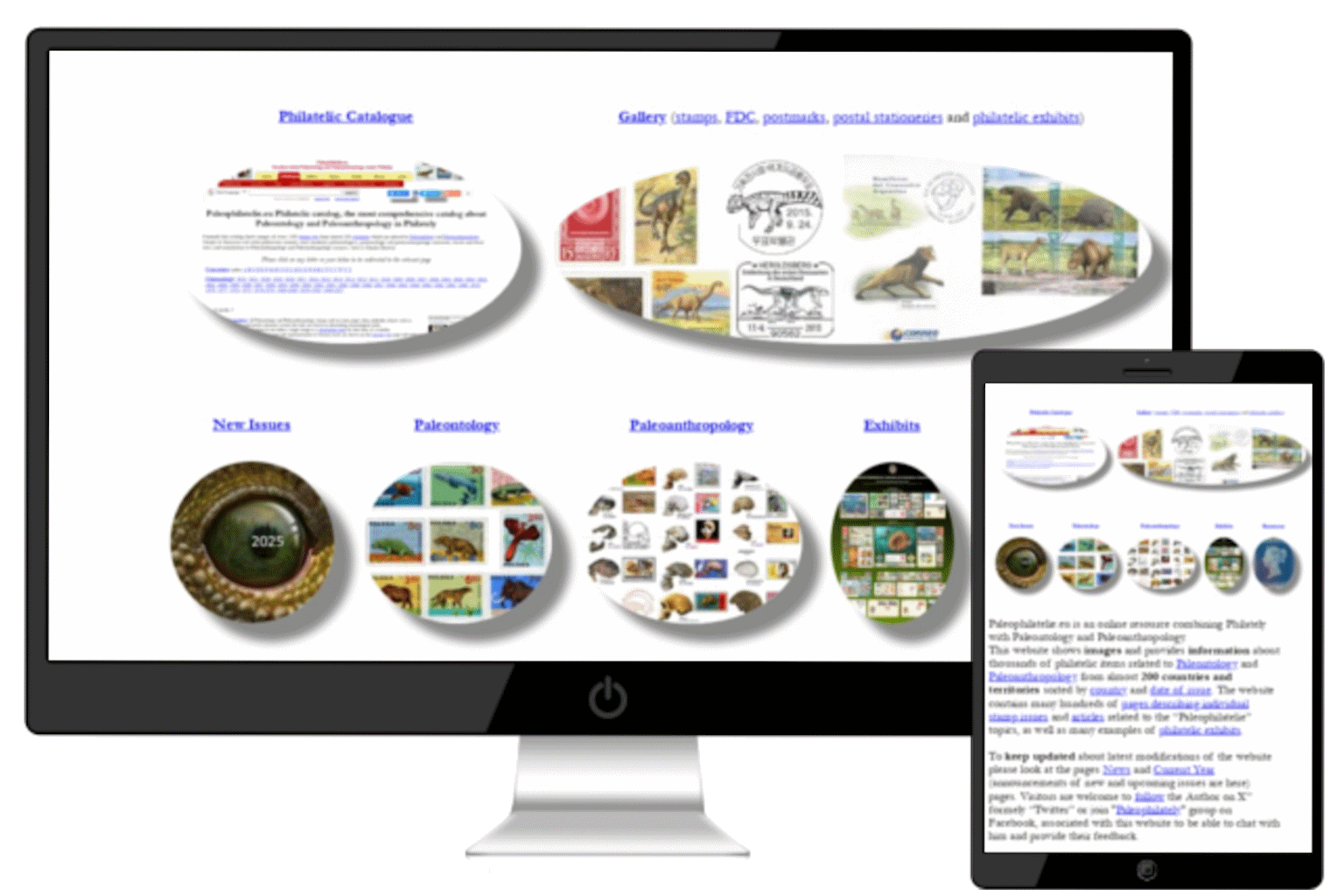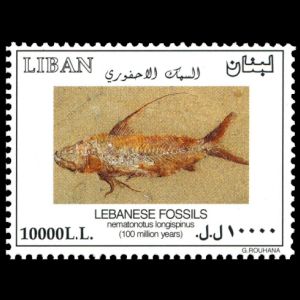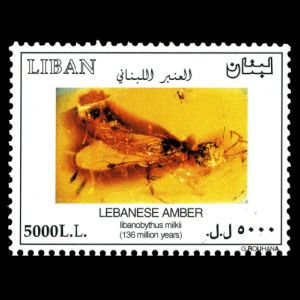Lebanon
Fossil of prehistoric fish and insect in amber on stamps of Lebanon
Contents:
Lebanon, officially the Lebanese Republic, is a sovereign state in the Middle East.
It is bordered by Syria to the north and east and
Israel to the south, whilst
Cyprus is west across the Mediterranean Sea.
At just 10,452 km2, it is the smallest recognized country in the Middle East.
Estimated population of the country is 6.8 million.
Lebanon was conquered by the Ottomans in the 16th century and remained under their rule for the next 400 years.
Following the empire's collapse after World War I,
France acquired a mandate over the northern
portion of the former Ottoman Empire province of Syria.
The French demarcated the region of Lebanon in 1920 and granted this area independence in 1943.
Prior to the civil war (1975-90), the country enjoyed a diversified economy that included tourism, agriculture, commerce, and banking.
Its financial power and stability through the 1950s and 1960s earned Lebanon the name of "Switzerland of the East".
Since the end of the war, there have been extensive efforts to revive the economy and rebuild national infrastructure.
Neighbouring Syria has long influenced Lebanon's foreign policy and internal policies, and its
military occupied Lebanon from 1976 until 2005.
Lebanon's borders with Syria and Israel remain unresolved.
[R1]
The Lebanese Republic was proclaimed on 23 May 1926.
At first stamps were overprinted Republique Libanaise.
Later stamps were prepared in the name of the new republic and from the 1940s the word Liban was used.
Today all stamps of Lebanon are marked simply Liban.
[R2]
Official stamps of Lebanon related to Paleontology: fossil, prehistoric fish, insect in amber
Notes:
[1] Between 11.10.2002 and 08.01.2003 post authority of Lebanon issued 10
definitive stamps shows various sightseeing’s of the country.
The first 8 stamps were issued on 11.11.2002 and 20.11.2002 show "traditional"
sightseeing: famous buildings and landscapes.
 |
|
Definitive stamps of Lebanon 2002, with "traditional" sightseeings.
MiNr.: 1425-1432, Scott:
|
The last two stamps of the set, with the highest face values, were issued on different dates:
22.11.2002 - Fish fossil (
Nematonotus longispinus),
08.01.2003 - Amber with insect (
Libanobythus milkii) inclusion.
Fossils of Lebanon on personalized stamps of France
| 01.10.2016 "Insect Fossils of Lebanon" |
01.10.2017 "Insect Fossils of Lebanon" |
01.10.2018 "Insect Fossils of Lebanon" |
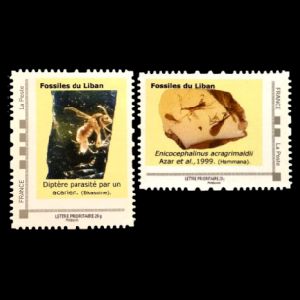 |
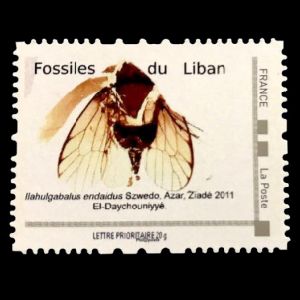 |
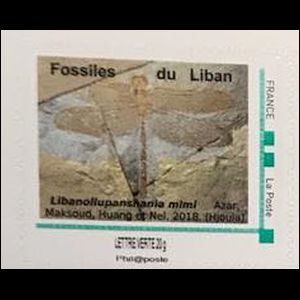 |
| 01.10.2019 "Fossils of Lebanon" |
01.10.2020 "Insect Fossils of Lebanon" |
15.10.2021 "Fossils of Lebanon" |
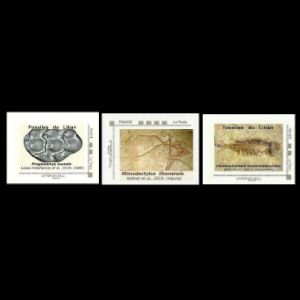 |
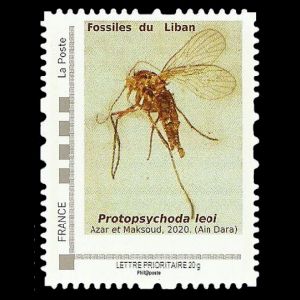 |
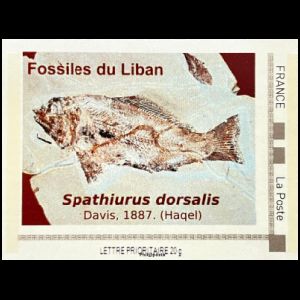 |
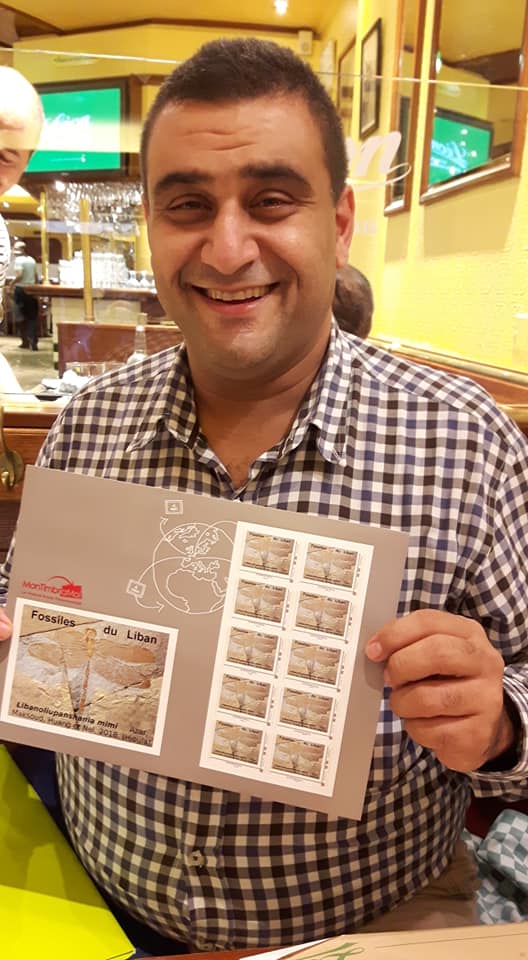 |
|
Professor at Lebanese University Dany Azar with Mini-Sheet of one of his personalized stamps, from 2018.
|
Notes:
Since 2016, Professor Dany Azar of the Lebanese University has issued personalized stamps using the French Post.
These stamps depict fossils of Lebanon.
These personalized stamps have been regularly issued in October every year for International Fossil Day
and for the the International Fossil Insects Day.
The International Fossil Day is celebrated every October by the International Palaeontological Association.
The Association sponsors open houses at museums, universities or institutes, lectures, treks through
fossil beds, posters, kid activities, blogs and other creative ways to inform people about fossils.
The purpose of the day is to make widespread public awareness of the importance of fossils and their
preservation.
[R3]
The International Fossil Insects Day was declared by Professor Dany Azar
at the International Meeting of the Palaeoentomological Society (IPS) held in Edinburgh in 2016.
(Professor Azar was the President of the International Palaeoentomological Society at that time).
The purpose of the Day is to promote fossil insects.
[R4]
References:
Acknowledgements:
Many thanks to Dr.
Peter Voice from Department of Geological and Environmental Sciences, Western Michigan University,
for reviewing the draft page and his valuable comments.
